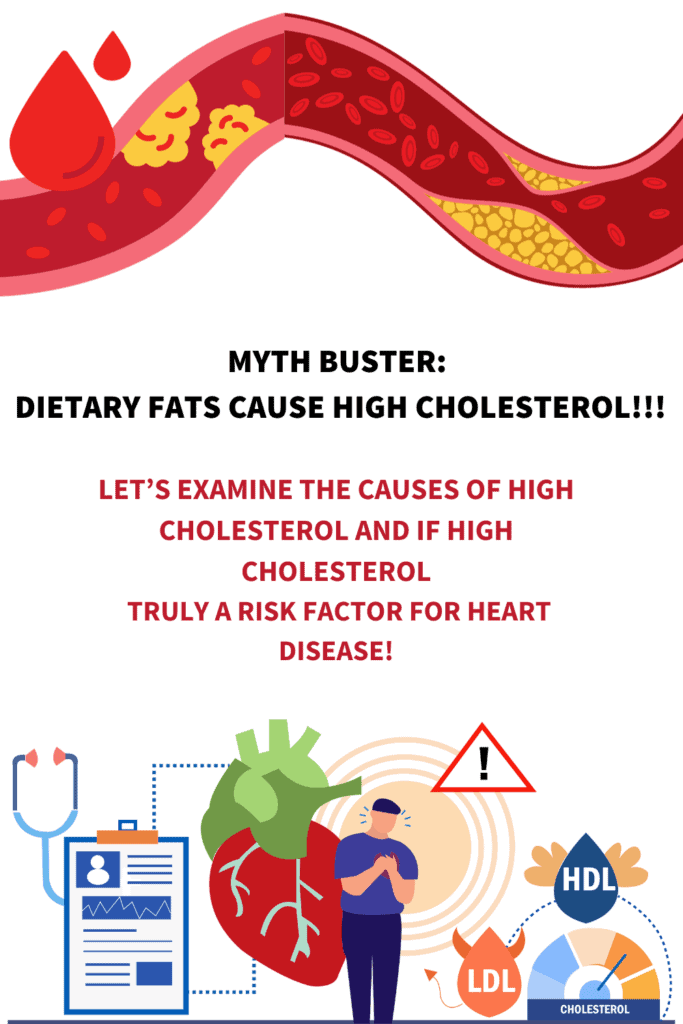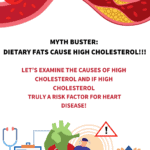Why is fat blamed for high cholesterol when it’s usually sugar to blame? What does my diet have to do with my high cholesterol? Have you been diagnosed with high cholesterol and put on a low-fat diet, only to feel awful and see your health decline?

Let’s examine why high cholesterol isn’t actually caused by consuming dietary fats.
The link between inflammation, blood sugar dysregulation, hormone imbalance, and high cholesterol is complex and has been the subject of extensive research. Let’s break this down:
Inflammation and Cholesterol:
- Cholesterol is often seen as a response to inflammation in the body, especially in the arteries.
- When the arterial walls become damaged due to factors like oxidative stress or inflammation, the body sends LDL cholesterol (often termed “bad cholesterol”) to patch up and heal the damage. This can lead to plaque formation if the inflammation continues.
- Rather than being the root cause of the problem, high cholesterol, in this context, can be viewed as a symptom of ongoing inflammation.
- More on managing inflammation in this article.
Blood Sugar Dysregulation:
- Chronically high blood sugar levels (often a result of diets high in refined carbohydrates and sugars) can lead to increased inflammation in the body.
- High blood sugar can damage blood vessels, leading to the formation of Advanced Glycation End-products (AGEs) which promote inflammation and oxidative stress.
- Insulin resistance, a condition where cells don’t respond efficiently to insulin, is often associated with high blood sugar. Insulin resistance can further exacerbate inflammation.
- As a response to this inflammation, as mentioned earlier, the body may produce more cholesterol.
Hormone Imbalance:
- Hormones play a crucial role in regulating various metabolic processes, including cholesterol synthesis and clearance.
- For example, thyroid hormones influence cholesterol metabolism. An underactive thyroid (hypothyroidism) can lead to elevated cholesterol levels.
- Sex hormones, such as estrogen, also play roles. For example, estrogen can help raise HDL (often termed “good cholesterol”) levels and lower LDL levels. Hormonal changes, like menopause, can thus influence cholesterol profiles.
Fat Consumption:
- It was once believed that consuming saturated fats led directly to high cholesterol and heart disease. However, more recent research has nuanced this perspective.
- While trans fats (artificially created fats) are harmful and can increase the risk of heart disease, the relationship between saturated fats (found in foods like butter and red meat) and heart disease is more complex. Some people might be more sensitive to saturated fats, but for many, moderate consumption isn’t directly problematic. You can learn more about healthy fats in my Guide to Healthy Fats.
- Instead, diets high in refined carbohydrates and sugars seem to be more strongly linked with adverse metabolic outcomes and heart disease than diets high in naturally occurring fats.
A Holistic View:
- Cholesterol, by itself, isn’t inherently “bad.” It’s a vital substance in the body, required for building cell membranes, producing hormones, and more.
- It’s essential to consider cholesterol within the broader context of overall health, including inflammation, blood sugar levels, and hormone balance.
- Lifestyle factors such as a balanced diet, regular exercise, stress management, and avoiding smoking can all influence inflammation, blood sugar regulation, and cholesterol levels in positive ways.
It’s important to consult with a healthcare professional to understand individual cholesterol profiles and determine the best approach for maintaining heart health. They can provide guidance tailored to individual circumstances and health history. If you would like to schedule a nutritional assessment with me, schedule your call here.
Links to Studies
- Effects of Inflammation and Infections on Lipoproteins
- Hyperlipidemia and Hypothyroidism
- Influence of Sugar Intake on Metabolic Markers
- Diabetes Hypertension and Cardiovascular Disease
- High Cholesterol and Diabetes

But Doesn’t High Cholesterol Cause Heart Disease?
Actually, no. High Cholesterol is a loose risk factor for heart disease, so let’s break it down. The relationship between cholesterol and heart disease is nuanced and has been a topic of debate and investigation for decades. Here’s a comprehensive breakdown:
Cholesterol and Atherosclerosis:
- Atherosclerosis is the hardening and narrowing of the arteries due to plaque buildup. These plaques consist of fats, cholesterol, calcium, and other substances from the blood.
- If a plaque breaks open or ruptures, it can trigger a blood clot, leading to heart attacks or strokes.
- LDL cholesterol (often termed “bad cholesterol”) is particularly associated with the formation of these plaques. When LDL cholesterol is oxidized (modified by free radicals), it becomes even more atherogenic, meaning it contributes more readily to the development of atherosclerosis.
High Cholesterol as a Risk Factor:
- Elevated LDL cholesterol levels are considered a significant risk factor for heart disease.
- However, it’s essential to note that having high cholesterol doesn’t guarantee one will develop heart disease, and having normal cholesterol levels doesn’t mean one is immune from it. Cholesterol is one of many factors in a multifaceted equation.
Other Important Metrics:
- While a lot of emphasis is placed on total cholesterol or LDL cholesterol, other lipid metrics also play crucial roles in cardiovascular health:
- HDL cholesterol: Often termed “good cholesterol,” higher levels are associated with a reduced risk of heart disease. HDL is believed to help remove cholesterol from the arteries.
- Triglycerides: High levels of this type of fat in the blood have been linked to an increased risk of heart disease.
- Particle Size and Number: LDL particles can vary in size and density. People with predominantly small, dense LDL particles might have a higher risk of heart disease than those with larger, less dense particles. Recent research suggests that the number of LDL particles (LDL-P) might be a more predictive measure than just LDL cholesterol levels.
Broader Context:
- It’s essential to view cholesterol within the larger context of overall health. Other factors like high blood pressure, smoking, diabetes, obesity, poor diet, physical inactivity, and excessive alcohol consumption can also contribute to heart disease risk.
- Genetics can play a role, as some people have familial hypercholesterolemia, a condition where very high cholesterol levels are passed down through families.
Shift in Understanding:
- Earlier, the primary focus was on lowering LDL cholesterol to reduce heart disease risk. Now, the understanding is shifting towards managing inflammation, oxidative stress, and overall metabolic health, which all interact with cholesterol metabolism.
In conclusion, while high cholesterol, particularly high LDL levels, is a known risk factor for heart disease, it isn’t the sole cause. Heart disease is multifactorial, and its development involves the interplay of cholesterol with various other factors, both genetic and environmental. Regular check-ups and consultations with healthcare professionals can help in understanding individual risk profiles and appropriate preventive measures.

So, What ARE the Causes of Heart Disease If it’s Not Eating Fat or High Cholesterol?
Heart disease is multifactorial, meaning it arises due to a combination of various factors. While elevated LDL cholesterol, is one of the known risk factors, many other factors contribute to the development and progression of heart disease. Here are the main causes and risk factors for heart disease that aren’t directly related to cholesterol:
High Blood Pressure (Hypertension):
- Persistent high blood pressure damages arteries, making them less elastic and more prone to atherosclerosis. It’s one of the leading risk factors for heart disease and stroke.
Smoking:
- Smoking damages the lining of the arteries, leading to the buildup of fatty material (atheroma) and the narrowing of the artery. This can result in angina, heart attacks, and stroke.
- Chemicals in tobacco can also damage the heart and blood vessels, leading to the thickening and narrowing of the arteries.
Diabetes:
- Diabetics, especially those with poor blood sugar control, face a higher risk of heart disease. High blood sugar levels can lead to increased damage to blood vessels and the nerves that control the heart.
Obesity:
- Obesity is associated with higher LDL cholesterol levels, lower HDL cholesterol, hypertension, and increased risk of type 2 diabetes. All of these contribute to a higher risk of heart disease.
Physical Inactivity:
- Lack of regular exercise can lead to obesity, hypertension, and elevated blood sugar – all risk factors for heart disease.
Poor Diet:
- Diets high in trans fats, and refined sugars, and low in fruits, vegetables, and lean proteins can contribute to heart disease risk.
Excessive Alcohol Consumption:
- While moderate alcohol consumption might be associated with certain heart benefits, excessive drinking can lead to high blood pressure, heart failure, and even stroke.
Chronic Inflammation:
- Inflammation plays a role in the development of atherosclerosis. Conditions that cause chronic inflammation (like rheumatoid arthritis and some infections) can increase the risk of heart disease.
Genetics and Family History:
- Individuals with a family history of heart disease, especially if a close relative had heart disease at an early age, are at higher risk.
Age:
- Simply getting older increases the risk of damaged and narrowed arteries.
Gender:
- Men have a higher risk of heart attacks than women and tend to have them earlier in life. However, after menopause, the risk for women increases and becomes more comparable to that of men.
Stress:
- Chronic stress, and how one responds to stress, may increase the risk of heart disease, potentially through mechanisms like high blood pressure or unhealthy habits developed as coping mechanisms.
Sleep Disorders:
- Conditions like sleep apnea, where breathing repeatedly stops and starts, can lead to a variety of cardiovascular problems, including heart disease.
It’s important to note that while each of these factors can independently raise the risk of heart disease, they can also interact and compound risk. For example, obesity can lead to diabetes and high blood pressure, magnifying the overall threat. Therefore, managing and mitigating these risk factors through lifestyle choices and medical interventions is crucial for heart health.






Leave a Comment